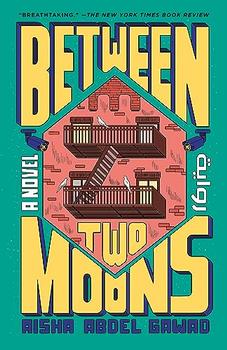Summary | Excerpt | Reviews | Beyond the Book | Readalikes | Genres & Themes | Author Bio

A Novel
by Aisha Abdel GawadA
We woke that morning, the first day of what would be a very hot Ramadan in June, to find the police raiding Abu Jamal's café. A dozen men, dressed more like construction workers than cops, loaded boxes of Nescafé instant coffee and Lipton tea into vans. They carried away glass shisha pipes the size of small children, and dumped mismatched cups and saucers into a large bin of shattered porcelain. Some led dogs on leashes—big majestic German shepherds and one runty beagle, who sniffed furiously around all the tables.
I might have slept through it. I might have woken up a few hours later to find Abu Jamal's café closed, to be replaced a few months later with another Arab business—a falafel stand or a travel agency specializing in trips to Mecca. But Baba woke me up.
"Wake up, ya binti," he said as he pushed our bedroom window open, the one that led out onto the apartment's fire escape. "Shoof! They arrest that stupid Libyan."
He climbed out onto the fire escape in his ratty old galabiya with his black hair sticking straight up. In the bed across from mine, my twin sister, Lina, put a pillow over her face and groaned.
"Hurry up, Amira," Baba called to me. "Come see." He sounded gleeful. He leaned against the railing and peered down to the street below to get a closer look. Baba didn't like Abu Jamal, not since they got into a big argument over whose dictator was worse, Egypt's or Libya's. It escalated until Abu Jamal accused Egyptians of turning everyone into religious nuts. "Look at your wife!" he'd said. And that's when Baba slammed his hand down on one of the plastic folding tables, right in the middle of Abu Jamal's café, and shattered a plate filled with discarded olive pits. "It was just a plate," Baba said when he returned home later that night. But that didn't matter—ever since then, Baba had been banned. He was now forced to walk another three blocks to the next-nearest shisha café, and for that, he just couldn't find it in him to forgive the stupid Libyan.
I pulled on a sweatshirt of Lina's that she'd left lying on the floor and flipped the hood over my head to cover my hair before I stepped out onto the fire escape next to Baba. The approaching dawn spread like a great purple bruise over New York, but the café was illuminated by a streetlight as if by an interrogator's lamp. The men with their dogs were milling in and out, talking into radios, and taking photographs. They were moving so fast—I wanted to call down to them, ask them to slow down, so that I could make sense of what I was seeing. Across the street, Imam Ghozzi, who volunteered as the custodian of the Islamic Center of Bay Ridge, swept dust and bits of trash off the sidewalk in front of the mosque as if nothing unusual were happening.
"What do you think he did?" I asked Baba.
"He probably steal money from little babies," Baba said.
"It looks like they're sniffing for bombs or drugs or something," I said.
Baba blinked rapidly three times, like he does when he can't hear. "Bombs? No, it's nothing like that." He took a step back from the fire escape.
I heard a rustling behind us and turned to find Mama standing at the window with her arms crossed. Her face was pink and glowing, and I could tell it was freshly scrubbed for prayer. She was wearing a long gray abaya and a white prayer veil.
"What's going on out here?" she asked.
"Shoof, ya Maryam," Baba said, "they are arresting the stupid Libyan! Come and see."
"Shame on you, Kareem," Mama said. "You want to bring bad luck on us like that?"
Mama's God was a capricious one. He could turn on you on a dime. You had to be careful.
"No, no, Amira and me just out here praying that God forgive the stupid Libyan's sins," Baba said, grinning at me.
Mama snorted and then leaned down to wake Lina. She removed the pillow from over Lina's face, and the lacy edges of her prayer veil brushed Lina's cheek. Lina swatted it away like a fly. "Sabah al-khair, ya gamila," she said.
Excerpted from Between Two Moons by Aisha Abdel Gawad. Copyright © 2023 by Aisha Abdel Gawad. All rights reserved. No part of this excerpt may be reproduced or reprinted without permission in writing from the publisher.






Children are not the people of tomorrow, but people today.
Click Here to find out who said this, as well as discovering other famous literary quotes!
Your guide toexceptional books
BookBrowse seeks out and recommends the best in contemporary fiction and nonfiction—books that not only engage and entertain but also deepen our understanding of ourselves and the world around us.